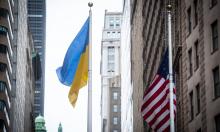New York gives condoms to senior citizens
As volunteers served desert at a senior center in New York City, other volunteers were distributing something else to the elderly: condoms.
"You're giving out condoms," said Rose Crescenzo, 82, "but who's going to give us a guy?"
The condom giveaway is part of an effort by the New York City Department of Aging to educate older people about the risks they may face of contracting the virus that causes AIDS. Free HIV testing was offered as well.
AIDS education of the elderly has become an important issue as antiretroviral drugs keep patients living longer. Experts warn that ignorance about HIV among seniors can lead to new infections.
In one case, a doctor from Howard University Hospital in Washington recently diagnosed unsuspected HIV in an 82-year-old.
"Often older people do not concern themselves with HIV and AIDS because they assume that they are not at risk, and that can be a tragic mistake," said Edwin Mendez-Santiago, New York City's commissioner of aging.
A study last year by the AIDS Community Research Initiative of America projected that within the next decade, the majority of HIV-infected New Yorkers will be over 50.
The group's research found that many older New Yorkers with HIV are isolated and may not use the city's network of more than 300 senior centers.
New York City has the most HIV cases of any U.S. city - nearly 100,000 - and is considered a leader in the area of AIDS education for seniors, with the City Council having budgeted $1 million (EUR730,000) toward HIV education for older people.
But smaller-scale campaigns are also under way elsewhere.
Nancy Orel, a professor of gerontology at Bowling Green State University in Ohio, is organizing an October workshop for seniors that will include free condoms and HIV tests.
"Unfortunately, most individuals have the perception that sex ends at, what, 32?" Orel said. "And many older adults report that when they go to see their physicians, the physicians don't ask if they're sexually active."
Dorcas Baker, who directs an AIDS education center in Baltimore, said health officials there began HIV prevention programs at senior centers in 2005.
"We call it the silent epidemic because no one thinks seniors are sexual or that they're using drugs," she said.
Dr. Bernard Branson, associate director for laboratory diagnostics in the Division of HIV/AIDS Prevention at the U.S. Centers for Disease Control and Prevention, said that people aged 50 to 64 accounted for 14 percent of new HIV diagnoses in 2005, while those over 65 comprised only about 2 percent of HIV diagnoses.
But Branson said doctors should consider the possibility of HIV at all ages.
At the senior center in New York, 66-year-old AIDS educator Edward Shaw recounted his own 1988 diagnosis and warned, "If you're still having sex, you need to know about HIV/AIDS."
Many of the seniors ignored him. But Marie Tarantino, who gave her age as "39-plus," said lonely seniors might take unwise risks.
"They might pick somebody up on the street," she said. "They just think that at a certain age they can't get pregnant. They don't think they could get a sexually transmitted disease."
And Crescenzo, who lost her husband of 62 years last October, did take the condoms.
"If I get a date," she said, "I'm going to use one of these."
Subscribe to Pravda.Ru Telegram channel, Facebook, RSS!





